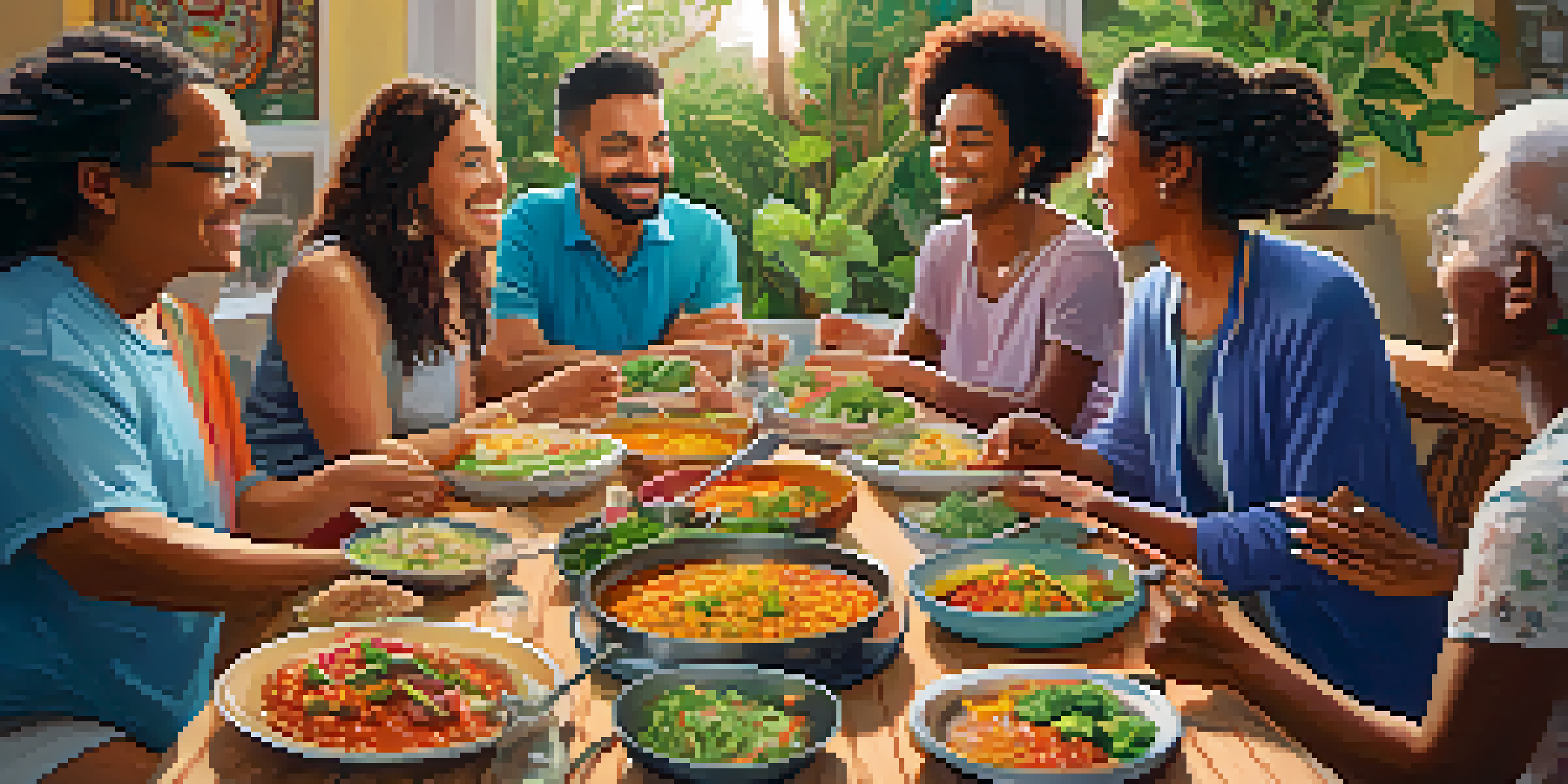Veganism and Cultural Traditions: Ethical Considerations

Understanding Veganism: More Than Just a Diet
Veganism is often perceived as simply a dietary choice, but it encompasses a broader ethical lifestyle. At its core, veganism advocates for the avoidance of animal products to minimize harm to animals and the environment. This commitment to compassion can sometimes clash with cultural traditions that include animal-based foods. Understanding this complexity is essential in discussing veganism's role in diverse cultural contexts.
Eating is an agricultural act.
For many, food is a key aspect of cultural identity, and traditional meals often feature animal products. This can create a sense of conflict for those wishing to embrace veganism while honoring their heritage. Recognizing that cultural practices are deeply rooted in history allows for a more empathetic discussion about dietary choices and their implications for identity.
Ultimately, veganism challenges us to rethink our relationship with food and the ethical implications of our choices. It encourages a dialogue about how we can preserve cultural traditions while also considering the welfare of animals and the planet. This ongoing conversation is vital in creating a more inclusive understanding of both veganism and cultural practices.
Cultural Traditions and Their Connection to Food
Food is a cornerstone of cultural traditions, often representing history, community, and identity. Various cultures have unique dishes that are typically centered around animal products, such as barbecues, holiday feasts, and family recipes passed down through generations. These culinary practices not only nourish but also bind communities together, making it crucial to approach any changes with sensitivity and respect.

When individuals choose to adopt a vegan lifestyle, they may feel a disconnect from these age-old customs, leading to feelings of isolation or guilt. However, many cultures also have plant-based dishes and traditions that can be celebrated and adapted. Emphasizing these alternatives can help bridge the gap between veganism and cultural heritage, promoting inclusivity.
Veganism as an Ethical Lifestyle
Veganism extends beyond diet, advocating for compassion towards animals and the environment while navigating cultural complexities.
Furthermore, exploring vegan adaptations of traditional dishes can foster creativity and innovation in cooking. This allows for a celebration of cultural identity while aligning with ethical principles. By recognizing and honoring both aspects, communities can thrive and evolve without sacrificing their roots.
Ethical Considerations: Balancing Tradition and Compassion
At the heart of veganism lies a strong ethical foundation that prioritizes the welfare of animals and environmental sustainability. However, this ethical stance can sometimes conflict with cultural practices that involve animal consumption. Navigating these ethical considerations requires a nuanced understanding of both sides, and it encourages a thoughtful dialogue about the impact of our dietary choices.
Veganism is not a sacrifice. It is a joy.
Acknowledging the importance of cultural traditions is essential, but so is recognizing the ethical implications of continuing to consume animal products. Many cultures have evolved over time, and practices that were once necessary for survival may no longer hold the same relevance today. This evolution invites discussions about how we can honor traditions while promoting ethical dietary choices.
Finding a balance between respecting cultural practices and advocating for animal welfare can be challenging, yet it is possible. By creating open dialogues, communities can explore alternative practices that honor both tradition and compassion, ultimately leading to a more ethical and inclusive society.
The Role of Education in Fostering Understanding
Education plays a pivotal role in bridging the gap between veganism and cultural traditions. By informing individuals about the ethical, environmental, and health benefits of veganism, we can foster a more empathetic understanding of this lifestyle. Workshops, cooking classes, and community discussions can serve as platforms for sharing knowledge and experiences.
Furthermore, educating communities about the history and significance of their traditional foods can encourage dialogue about the future of these practices. This understanding can lead to more thoughtful adaptations of traditional dishes that align with vegan principles while still honoring cultural significance. Sharing stories and personal experiences can create a deeper connection and appreciation for both cultures and dietary choices.
Cultural Traditions and Food Identity
Food is a vital part of cultural identity, and adapting traditional recipes to veganism can help bridge the gap between heritage and ethical choices.
Promoting a culture of learning and open-mindedness can help ease tensions around dietary differences. By encouraging curiosity and respect, we pave the way for more inclusive conversations about food, tradition, and ethical living. This approach ultimately enriches both cultural heritage and the vegan movement.
Veganism in Diverse Cultural Contexts
Veganism is not a one-size-fits-all movement; it exists within various cultural contexts, each with its unique challenges and opportunities. In some cultures, vegetarianism or veganism has long been practiced, often rooted in spiritual beliefs that prioritize non-violence. In these contexts, embracing veganism can feel like a natural extension of cultural values.
Conversely, in cultures where meat consumption is deeply embedded in traditions, the transition to veganism can be more complex. Understanding these nuances is essential for fostering respectful discussions about dietary choices. For instance, recognizing that a traditional dish may hold significant meaning can help navigate conversations around substitutions without dismissing its cultural importance.
Ultimately, by embracing the diversity of veganism across cultures, we can celebrate the richness of human experience. Each culture offers unique perspectives on food and ethics, which can contribute to a broader understanding of veganism. This diversity not only enriches the movement but also fosters a sense of global community.
Innovative Vegan Recipes Inspired by Cultural Dishes
As we explore the intersection of veganism and cultural traditions, innovative recipes emerge that pay homage to both worlds. By reimagining traditional dishes using plant-based ingredients, we can create meals that honor cultural heritage while aligning with vegan principles. For example, swapping dairy with coconut milk in a classic curry can maintain its authenticity while making it vegan-friendly.
These adaptations allow for the enjoyment of familiar flavors without compromising ethical beliefs. Incorporating local, seasonal produce into these recipes can also highlight the connection between culture and sustainability. This not only supports local farmers but also reinforces the importance of ethical consumption.
Education Fosters Inclusivity
Educational initiatives can promote understanding and respect for both veganism and cultural traditions, fostering empathy and collaboration.
Furthermore, sharing these innovative recipes within communities can create opportunities for connection and celebration. Potlucks featuring vegan takes on traditional dishes can invite dialogue and foster understanding among diverse groups. This creative exploration can lead to a deeper appreciation of both cultural traditions and the principles of veganism.
Building Bridges: The Future of Veganism and Culture
Looking ahead, the future of veganism and cultural traditions lies in building bridges rather than erecting walls. As more people embrace plant-based lifestyles, there is an opportunity to create inclusive spaces that honor both ethical considerations and cultural practices. Encouraging collaboration among chefs, community leaders, and activists can foster innovative solutions that respect both traditions and ethical values.
Developing community-driven initiatives, such as plant-based cultural festivals or educational programs, can celebrate diversity while promoting ethical living. These events can serve as a platform for sharing stories, recipes, and experiences that highlight the beauty of both veganism and cultural heritage. Creating these shared spaces can help demystify veganism and inspire others to explore this lifestyle.

Ultimately, a future where veganism and cultural traditions coexist harmoniously is possible. By engaging in respectful conversations, celebrating diversity, and promoting innovation, we can create a world that embraces compassion, ethics, and cultural richness. This collaborative approach will not only benefit individuals but also enrich our communities.